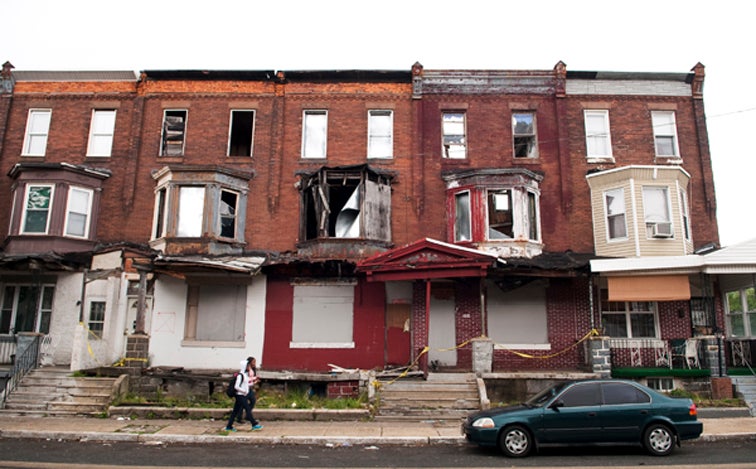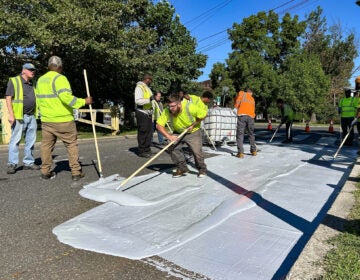Situation Vacant: Fighting back blight in Hunting Park

Alongside PlanPhilly’s panel discussion about the city’s vacant land strategies on June 12th, Eyes on the Street is collecting and sharing stories from Community Contributors about the effects of vacancy and blight on neighborhood quality of life, community development, and the potential for positive change presented by the city’s vacant property reform efforts. Ruth Torres reflects on the physical and psychological effects of living with blight on her block in Hunting Park, and the hope she finds in efforts like the Community Justice Land Trust.
When my parents retired to Puerto Rico, they left me our house in Hunting Park. We first moved to the neighborhood in 1972 when I was 11 years old. It was a real nice neighborhood, everything was really clean. Today, the neighborhood is like a war zone. Every third house is abandoned. This one house on my block is falling down so bad you can look through the house straight up to the sky.
The house next to me is abandoned and falling apart. It’s been empty for more than 20 years. I had to call the City many times just to get them to board it up. At first, I said to myself: “It will be all right. I have faith in the City and the City will clean it up eventually.” But it seems like eventually never comes. When will the City take responsibility for some of these abandoned homes?
It would be nice if I could purchase the house next door, demolish it, maybe make a side yard. But I can’t afford that. If feels like if you don’t know somebody or have some money, there’s nothing you can do. It’s so depressing to live here. I’m embarrassed to have people over. I try to clean up, but it feels never ending. I had to adopt an alley cat to help keep the rodents away. I’d never had a cat before. I used to like to sit on my front porch and watch people walk by. Then it got to the point where I dreaded coming onto the block. I would just walk into my house, shut the blinds and forget about it. Just lock myself in until the next day.
I want to struggle and try and make things better. That’s why I’m so grateful for the Women’s Community Revitalization Project. Through my work with WCRP, I’ve started to gain some trust in the system again. I see what the organization has done for the neighborhood. It gives you hope for the future. Although it’s also frustrating because you wish it could be done quicker. That’s why I’m excited about the possibility of creating a land bank. It will make it easier to access some of this vacant land.
Changing the way our neighborhoods look can change your cycle of thinking. If your surroundings look beautiful, you’re going to have a positive way of thinking. If your neighborhood looks like a war zone while everything you see on TV looks totally different, it makes you feel like you’re not worth anything. So why should you care?
WCRP created the Community Justice Land Trust to turn ugly vacant spaces into beautiful places, and to make sure it stays affordable for the long run, so we can help generations of people. I care about the future of our children and I want them to have hope. That’s why this work means a lot to me.
———
Ruth Torres is a paralegal and a member of the board of the Women’s Community Revitalization Project, which is a member of the Campaign to Take Back Vacant Land.
Eyes on the Street is collecting stories about the effects of vacancy on neighborhood quality of life and community development in Philadelphia. If you want to share your story, send it our way.
WHYY is your source for fact-based, in-depth journalism and information. As a nonprofit organization, we rely on financial support from readers like you. Please give today.





